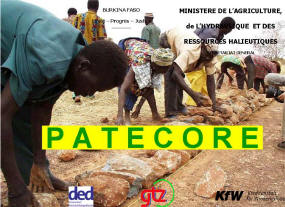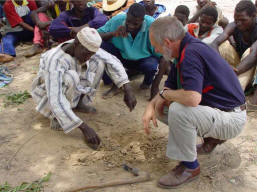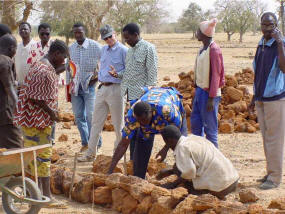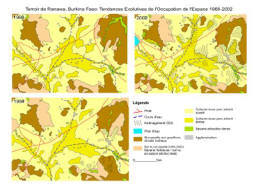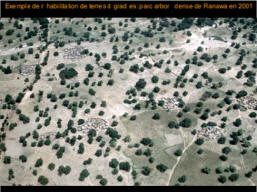|
|
||
|
PATECORE |
||
|
Together with the farmers, the sponsoring association Terra-Verde e.V. would like to continue the PATECORE activities. So here a short presentation of the project: PATECORE was planned as a pilot project within the German Sahel program and was started in 1988 as a bilateral German-Burkinian project. Many previous projects failed in their effort to combat erosion, because their approach was technocratic and the farmers were not adequately included in the planning and implementation phase. PATECORE has successfully started a project with a different approach: • Based on their traditional knowledge the farmers were placed in the center of the activities, • maximum of personal participation when building stone walls • adapted techniques (handicraft instead of machines)
Project sponsor for the whole period (1988 - 2006) was the Ministry of Agriculture. The Federal Ministry of Economic Cooperation and Development (Bundesministerium für wirtschaftliche Zusammenarbeit und Entwicklung(BMZ)) has authorized the following three organizations with the implementation of the German contribution: • Society for Technical Cooperation (GTZ GmbH - Gesellschaft für Technische Zusammenarbeit) • Development Bank (Kreditanstalt für Wiederaufbau (KfW) and • German Development Service (Deutsche Entwicklungsdienst (DED)
|
PATECORE = Projet d’Aménagement des Terroirs et de Conservation des Ressources dans le Plateau Central (Conservation and land development project of the Central Plateau) Mutual learning is the key to success PATECORE: a hallmark of the German Development Cooperation |
|
|
Results and effects This was achieved by: • Mobilizing and training about 800 farmer groups in more than 400 villages; • Special training of 2.000 farmers as advisors for the villages with regard to building contour stone walls and the integration of cattle farming for getting manure and compost; • Use of rented trucks for transporting about 3,5 million tons of stones; • Contour stone walls are built from these stones (total length about 40.000 km). About 70.000 ha of farmland are thus protected from soil erosion.
Reforestation and land use plans |
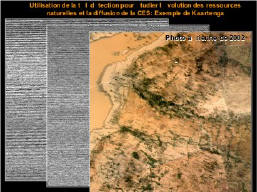 DBuilding contour stone walls in large areas has changed whole landscapes in the course of time Changes of land use were observed by means of remote sensing. 25 years ago a semi-desert and today a habitat with a good prospective for the future |
|
|
Simple measures, big effects About 400.000 inhabitants of rural areas on the northern Central Plateau (target groups/beneficiaries) profit from the following effects: • Increase of food production between 25% to 75% (depending on the initial situation and soil degradation); • What is not consumed directly by the farmers can be sold and the money then used for other social services (health, education); • Increase of land productivity (yield per ha) and thus less expansion of farmland. This means a protection of still relatively intact bush savannas; • Agricultural revolution was triggered and accelerated (integration of cattle farming and tillage); • Increase of agricultural carrying capacity (more people can live in the region without having to cause over-exploitation); • The results are fewer environmental refugees and therefore less conflicts (ecological, political and social) in the emigration regions.
PATECORE was very profitable: Increase of the natural capital, the soil, by 140 mio. EUR After subtracting the development costs of the first few years and calculating the profitability exclusively for the construction of contour stone walls, the annual financial statement is very positive. • Seen from the economical point of view the investments will have been ameliorated within four years; • With external knock-on financing of about 150 EUR per ha (costs for the transportation of stones and advisory services) together with the work of the farmers, this results in a surplus value of the soil amounting to 2.000 per ha (corresponds to an annual yield of Ø 400 kg millet à 0,25 EUR, capitalized with 5%); • For the total areas of 70.000 ha surrounded by contour stone walls this amounts to 140 million EUR (the required external knock-on financing amounts to 10 mio. EUR)
Stop of PATECORE The work is not terminated |
||
|
|
||
